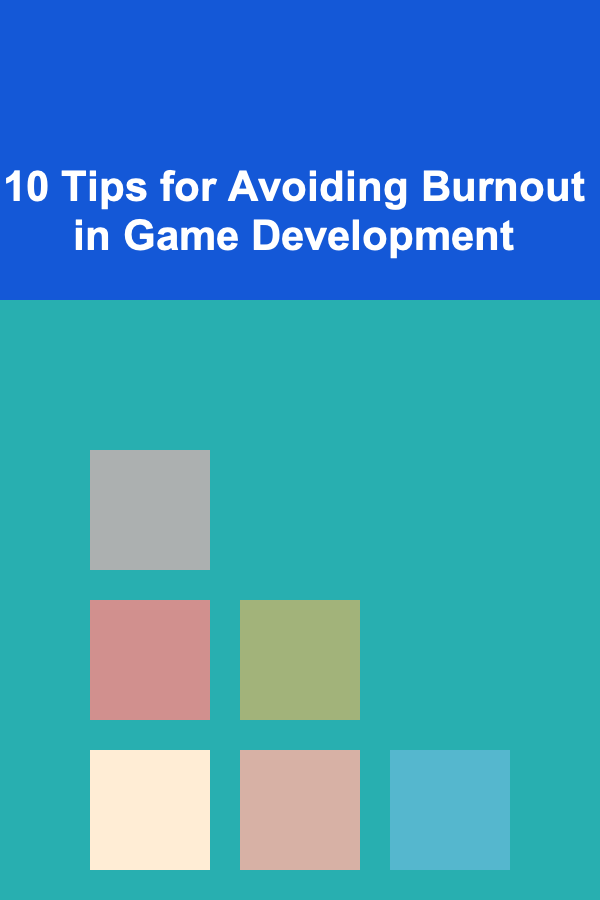
10 Tips for Avoiding Burnout in Game Development
ebook include PDF & Audio bundle (Micro Guide)
$12.99$6.99
Limited Time Offer! Order within the next:

Game development is an incredibly exciting and rewarding field, but it's also a highly demanding one. Developers often face long hours, tight deadlines, and high expectations from both players and stakeholders. While the thrill of bringing a game to life can be exhilarating, the pressures of the job can quickly lead to burnout if not managed properly. Burnout is not only detrimental to individual well-being but also impacts the productivity and creativity of the development team.
In this article, we'll explore 10 tips for avoiding burnout in game development, offering practical advice to help developers maintain their mental and physical health, while still delivering exceptional products.
Set Realistic Expectations and Deadlines
One of the primary causes of burnout in game development is the unrealistic pressure to meet overly ambitious deadlines. Developers are often tasked with creating complex, feature-rich games within timeframes that are simply not feasible. This leads to long hours, last-minute fixes, and immense stress.
Why It Matters:
- Sustainable Pace: Setting realistic expectations allows developers to work at a manageable pace, avoiding the intense rush toward the end of a project.
- Quality Over Quantity: Rushed work often leads to bugs, poor design choices, and incomplete features, which can affect the overall quality of the game.
- Team Morale: Unrealistic deadlines can lead to resentment and decreased motivation within the team.
How to Avoid It:
- Plan Ahead: Break down the development process into manageable phases and set clear, achievable goals for each milestone.
- Buffer Time: Always allow extra time for unforeseen issues and challenges, as they are inevitable in game development.
- Prioritize Features: Focus on delivering the most important features first, leaving less critical elements for later stages.
Practice Effective Time Management
Game development often requires juggling multiple tasks, including coding, designing, testing, and debugging. Without effective time management, developers can quickly become overwhelmed. Time management allows for a more balanced workload and reduces the risk of burnout.
Why It Matters:
- Balanced Workload: Time management helps you prioritize important tasks and ensures you're not overburdened with low-priority activities.
- Prevent Procrastination: By setting specific time blocks for certain tasks, you can avoid putting off important work until the last minute.
- Improve Focus: A structured schedule helps maintain focus on the task at hand and reduces distractions.
How to Avoid It:
- Use Time-Blocking: Allocate specific blocks of time for each task to ensure you stay on track.
- Break Tasks Into Smaller Chunks: Large tasks can be intimidating and lead to procrastination. Break them down into smaller, more manageable tasks.
- Avoid Multitasking: Focus on one task at a time to maintain high-quality work and avoid feeling overwhelmed.
Implement Regular Breaks
Working long hours without taking breaks can lead to both mental and physical fatigue. While it might feel like working through breaks will help you get more done, research shows that taking regular breaks actually increases productivity and reduces stress.
Why It Matters:
- Boosted Productivity: Taking short breaks helps reset your brain, allowing you to return to your work with renewed focus and energy.
- Prevent Physical Strain: Prolonged sitting or staring at a screen can lead to physical discomfort. Breaks provide a chance to stretch and rest your eyes.
- Mental Clarity: Regular breaks reduce cognitive fatigue and prevent burnout by giving you the opportunity to clear your mind.
How to Avoid It:
- Follow the 25/5 Rule: Work for 25 minutes and take a 5-minute break. After completing four cycles, take a longer break (15-30 minutes).
- Get Moving: Use breaks as an opportunity to stretch, walk around, or do some light physical activity.
- Step Away from Screens: Use breaks to rest your eyes and engage in activities that don't involve looking at a screen.
Foster a Healthy Work-Life Balance
In the fast-paced world of game development, it's easy to let work consume all of your time. However, maintaining a healthy work-life balance is essential for long-term success and mental well-being. When your personal life is neglected, stress builds up and creativity suffers.
Why It Matters:
- Reduced Stress: Balancing work with personal activities and hobbies reduces the overall stress you experience.
- Increased Creativity: Taking time off allows your mind to rest, which can lead to creative breakthroughs when you return to work.
- Better Relationships: A balanced lifestyle ensures that you have time to connect with family, friends, and other important aspects of your life.
How to Avoid It:
- Set Boundaries: Establish clear boundaries between work and personal life. For example, avoid working late into the night or on weekends unless absolutely necessary.
- Make Time for Hobbies: Pursue activities outside of work that bring you joy and relaxation, such as exercising, gaming, or spending time with loved ones.
- Take Vacations: Regular vacations provide a much-needed mental reset and help prevent long-term burnout.
Collaborate and Communicate Openly with Your Team
Game development is a team effort, and poor communication can lead to misunderstandings, frustration, and ultimately, burnout. Open, transparent communication fosters collaboration and ensures that everyone is on the same page.
Why It Matters:
- Shared Understanding: Regular communication ensures that everyone understands project goals, deadlines, and expectations.
- Problem-Solving: When challenges arise, collaborative communication helps the team come together to find solutions.
- Team Morale: Positive communication builds trust and strengthens relationships within the team, leading to higher morale and reduced stress.
How to Avoid It:
- Hold Regular Check-Ins: Schedule regular team meetings to discuss progress, address issues, and provide feedback.
- Be Transparent: Share challenges or delays as soon as they arise, so that the team can adapt and adjust.
- Encourage Collaboration: Foster an environment where everyone feels comfortable sharing their ideas and concerns.
Avoid Perfectionism
Perfectionism is a common trait in game development, as developers often want their games to be flawless. However, striving for perfection can lead to unnecessary delays and frustration. It's important to recognize when something is "good enough" and move on.
Why It Matters:
- Prevents Overwork: Trying to make every element of a game perfect often leads to spending excessive time on details that may not significantly impact the final product.
- Increases Productivity: Accepting that no game will be perfect allows you to focus on delivering a functional and enjoyable experience rather than obsessing over minor imperfections.
- Fosters Innovation: Accepting imperfection allows space for creative risk-taking, which often leads to groundbreaking ideas.
How to Avoid It:
- Set Priorities: Focus on the most important aspects of the game and leave less critical elements for later refinement or post-launch updates.
- Embrace Iteration: Accept that game development is an iterative process, and not everything needs to be perfect from the start.
- Limit Revisions: Once a feature is functional and meets the basic requirements, move on to the next task instead of making constant revisions.
Maintain Physical Health
The physical demands of sitting for long periods of time, staring at screens, and working in high-stress environments can take a toll on your body. Prioritizing your physical health helps reduce the risk of burnout and enhances overall productivity.
Why It Matters:
- Physical Stamina: Taking care of your body helps you maintain energy levels and focus throughout long development sessions.
- Stress Reduction: Exercise and good nutrition can help regulate stress hormones, making it easier to cope with the pressures of game development.
- Improved Focus: A healthy body supports mental clarity and creativity, which are crucial in game development.
How to Avoid It:
- Exercise Regularly: Aim for at least 30 minutes of moderate physical activity per day, whether it's going for a walk, running, or practicing yoga.
- Stay Hydrated: Drink plenty of water throughout the day to stay energized and focused.
- Maintain Proper Posture: Invest in a comfortable chair and workstation to reduce the risk of back pain, neck strain, and eye fatigue.
Ask for Help When Needed
In the fast-paced world of game development, it's easy to fall into the trap of thinking you need to handle everything yourself. However, asking for help is not a sign of weakness; in fact, it's an essential strategy for preventing burnout.
Why It Matters:
- Share the Load: Delegating tasks to others helps distribute the workload more evenly and ensures that no one person is overwhelmed.
- Leverage Expertise: Team members with different skills and perspectives can provide valuable insights and solutions to complex problems.
- Prevent Isolation: Asking for help fosters collaboration and creates a sense of community within the team.
How to Avoid It:
- Be Open: Don't hesitate to ask for assistance when you're struggling with a specific task or need support.
- Delegate: Trust your team members to handle tasks that fall within their areas of expertise, allowing you to focus on your strengths.
- Provide Help to Others: Offer assistance to your colleagues when needed, as this creates a supportive team dynamic.
Practice Mindfulness and Stress Management Techniques
Game development can be mentally taxing, with constant problem-solving, debugging, and decision-making. Mindfulness and stress management techniques can help you stay grounded, reduce anxiety, and improve your focus.
Why It Matters:
- Enhanced Focus: Mindfulness improves your ability to concentrate on tasks and reduces distractions.
- Stress Reduction: Techniques like deep breathing, meditation, or journaling can help lower stress levels and prevent burnout.
- Improved Decision Making: Staying calm and centered allows you to make better decisions and avoid hasty choices under pressure.
How to Avoid It:
- Try Meditation: Take a few minutes each day to meditate, focusing on your breath and clearing your mind.
- Practice Deep Breathing: Deep breathing exercises can help calm your nervous system and reduce stress.
- Mindful Breaks: Take mindful breaks throughout the day, stepping away from your work to relax and recharge.
Celebrate Small Wins
In the midst of complex development cycles, it can be easy to overlook small victories. However, celebrating progress---whether it's completing a major feature, fixing a stubborn bug, or hitting a milestone---can provide much-needed motivation and a sense of accomplishment.
Why It Matters:
- Boosts Morale: Recognizing achievements, no matter how small, reinforces a positive team atmosphere.
- Motivates the Team: Celebrating progress keeps the team engaged and focused on the end goal.
- Reduces Stress: Acknowledging your successes reminds you that you're making meaningful progress, reducing feelings of burnout.
How to Avoid It:
- Track Progress: Keep a visual record of your progress, whether it's a project management tool or a simple checklist.
- Celebrate with Your Team: Take time to acknowledge milestones, either privately or with the whole team.
- Reward Yourself: After achieving a significant goal, reward yourself with a small treat or break.
In conclusion, burnout is a serious issue that can hinder both individual well-being and game development productivity. By following these 10 tips---setting realistic expectations, managing your time, fostering collaboration, and prioritizing physical and mental health---you can reduce the likelihood of burnout and create a sustainable work environment that leads to long-term success in the industry.
Reading More From Our Other Websites
- [Home Maintenance 101] Best Ways to Keep Your Home Clean and Caring for Your Furniture
- [Rock Climbing Tip 101] How to Read Rock Features: A Beginner's Guide to Outdoor Route Finding
- [Home Maintenance 101] How to Optimize Your HVAC System's Performance Through Regular Air Filter Replacement
- [Personal Care Tips 101] How to Create a Double Winged Eyeliner Look
- [Home Holiday Decoration 101] How to Create a Winter Wonderland Vibe in Your Home
- [Home Maintenance 101] How to Choose and Utilize Essential Home Repair Tools for Common Household Fixes
- [Home Renovating 101] How to Install a Backsplash That Elevates Your Kitchen
- [Personal Care Tips 101] How to Find a Natural Hair Serum for Healthier Hair
- [Personal Investment 101] How to Make Smart Stock Market Investments for Long-Term Growth
- [Tie-Dyeing Tip 101] Best Minimalist Tie‑Dye Color Palettes for Modern Scandinavian Interiors

How to Build a Strong Brand Identity on YouTube to Support Your Dropshipping Business
Read More
How to Stage a Home for Quick Sale in a Competitive Market
Read More
How to Use Mindfulness Practices to Improve Family Dynamics
Read More
How To Reduce Your Cancer Risk Through Diet
Read More
Exploring Dwarf Planets: A Journey Beyond the Giants
Read More
How to Create a Social Media Checklist for Nonprofits
Read MoreOther Products

How to Build a Strong Brand Identity on YouTube to Support Your Dropshipping Business
Read More
How to Stage a Home for Quick Sale in a Competitive Market
Read More
How to Use Mindfulness Practices to Improve Family Dynamics
Read More
How To Reduce Your Cancer Risk Through Diet
Read More
Exploring Dwarf Planets: A Journey Beyond the Giants
Read More